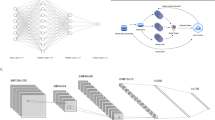Abstract
Breast cancer is when the cells in the breast tissue alter and proliferate uncontrollably, resulting in tumors and lumps. The pathways that connect the lobules to the papilla, or the lobules themselves, are the starting point for the development of most breast cancers. First, our study includes a thorough analysis of DL-based breast cancer prediction. Second, we provide a comparative study of the datasets best suited for breast cancer prediction. Third, we provide a comparative analysis of the most suitable core DL approaches for breast cancer prediction. Then, use the Statistical Variation Tool ANOVA parameters to refine the analysis of the best core forecasting algorithm, extract the accuracy gains, and generate statistical evidence for the best forecasting algorithm. In this study, the LDA AE algorithm provided a high accuracy of 98.27% using the gene expression dataset. The study concludes with an overview of current research and breast cancer detection and classification challenges.
Access this chapter
Tax calculation will be finalised at checkout
Purchases are for personal use only
Similar content being viewed by others
References
Zhang X, He D, Zheng Y, Huo H, Li S, Chai R, Liu T (2020) Deep learning based analysis of breast cancer using advanced ensemble classifier and linear discriminant analysis. IEEE Access 8:120208–120217
Arya N, Saha S (2022) Multi-modal classification for human breast cancer prognosis prediction: proposal of deep-learning based stacked ensemble model. IEEE/ACM Trans Comput Biol Bioinform 19(2)
Qi Q, Li Y, Wang J, Zheng H, Huang Y, Ding X, Rohde GK (2019) Label-efficient breast cancer histopathological image classification. IEEE J Biomed Health Inform 23(5)
Byra M, Dobruch-Sobczak K, Klimonda Z, Piotrzkowska-Wroblewska H, Litniewski J (2021) Early prediction of response to neoadjuvant chemotherapy in breast cancer sonography using Siamese convolutional neural networks. IEEE J Biomed Health Inform 25(3)
Huang Q, Miao Z, Zhou S, Chang C, Li X (2021) Dense prediction and local fusion of superpixels: a framework for breast anatomy segmentation in ultrasound images with scarce data. IEEE Trans Instrum Measure 70
Mercan C, Aygunes B, Aksoy S, Mercan E, Shapiro LG, Weaver DL, Elmore JG (2021) Deep feature representations for variable-sized regions of interest in breast histopathology. IEEE J Biomed Health Inform 25(6):2041–2049
Hua Z, Tanga J, Wang Z, Zhang K, Zhanga L, Sun Q (2018) Deep learning for image-based cancer detection and diagnosis—a survey. Pattern Recogn 83:134–149
Housseina EH, Emama MM, Alia AA, Suganthan PN (2021) Deep and machine learning techniques for medical imaging-based breast cancer: a comprehensive review. Expert Syst Appl 167:114161
Liu Z, Ni S, Yang C, Sun W, Huang D, Su H, Shu J, Qin N (2021) Axillary lymph node metastasis prediction by contrast-enhanced computed tomography images for breast cancer patients based on deep learning. Comput Biol Med 136:104715
Zhang D, Zou L, Zhou X, He F (2018) Integrating feature selection and feature extraction methods with deep learning to predict clinical outcome of breast cancer. IEEE Access 6:28936–28944
Acknowledgements
Due to the different datasets and imaging modalities used in the studies featured in this review, it is difficult to assess the efficacy (specificity and sensitivity) of all approaches in established cancer detection clinical practice. Most datasets are based on expert judgment or data from pathological reports, so it is appropriate to use evaluation results to demonstrate the utility of deep learning algorithms in cancer detection and diagnosis. Finally, some machine learning algorithms have yet to perform as well as deep learning in various applications. The success of deep learning in classifying and segmenting images of natural environments has stimulated research into using the technology for image-based cancer detection and diagnosis. One of the most challenging and time-consuming machine learning processes required for feature engineering is time-consuming, especially when dealing with duplicate image data. Moreover, current deep learning systems can be easily modified or adapted to new applications. It is important to remember that applying deep learning in real-world settings also has drawbacks. (1) Deep learning models usually require a lot of training data to outperform other approaches. (2) Even with the most powerful GPU hardware, the training process is computationally intensive, taking a long time to complete a deep and complex model; (3) the deep structure of a trained deep learning model is like a puzzle. To fully understand, it requires a specific approach.
Author information
Authors and Affiliations
Corresponding author
Editor information
Editors and Affiliations
Rights and permissions
Copyright information
© 2023 The Author(s), under exclusive license to Springer Nature Singapore Pte Ltd.
About this paper
Cite this paper
Selva Rathinam, P., Rajesh Kumar, S., Jegatheeswari, S. (2023). A Comparative Analytical Study of Breast Cancer Prediction Techniques Using Deep Learning Approaches for Research Novices. In: Kumar, S., Hiranwal, S., Purohit, S., Prasad, M. (eds) Proceedings of International Conference on Communication and Computational Technologies. ICCCT 2023. Algorithms for Intelligent Systems. Springer, Singapore. https://doi.org/10.1007/978-981-99-3485-0_5
Download citation
DOI: https://doi.org/10.1007/978-981-99-3485-0_5
Published:
Publisher Name: Springer, Singapore
Print ISBN: 978-981-99-3484-3
Online ISBN: 978-981-99-3485-0
eBook Packages: Intelligent Technologies and RoboticsIntelligent Technologies and Robotics (R0)




